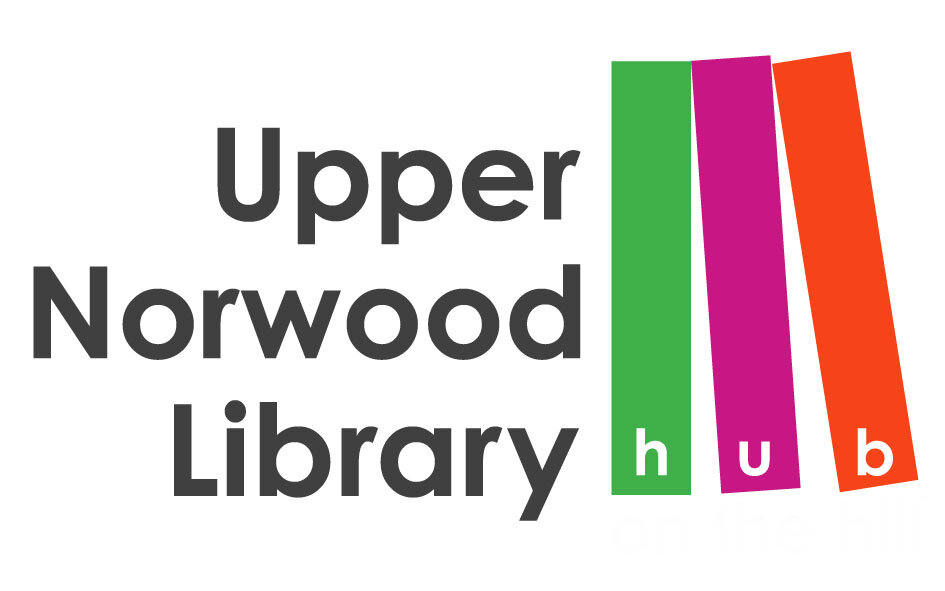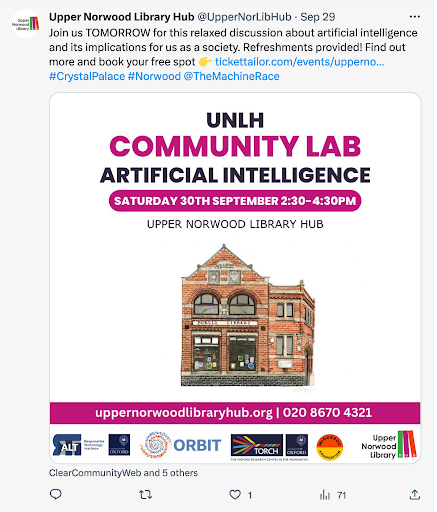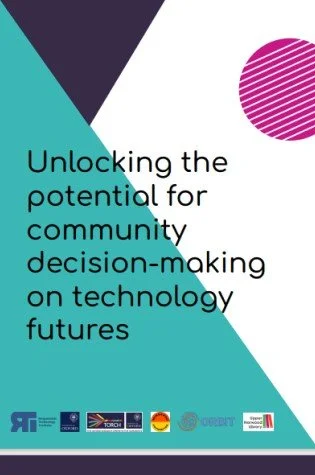Unlocking the potential for community decision-making on AI
From October 2022 to October 2023, the Upper Norwood Library Hub (UNLH) collaborated with the Responsible Technology Institute (RTI) at University of Oxford and ORBIT RRI Limited to deliver a pilot community lab exploring applications of Artificial Intelligence (AI) as they may affect society and the local community.
This pilot community lab aimed to go beyond traditional public engagement by connecting leading AI researchers directly with a broad representation of the community in their local library.
“The project was important for community members as it gave a voice to communities and people who may not otherwise be present in decision-making in the AI field.” - Jenny Irish, UNLH Director
The community lab featured a series of five public events, with each focused on one facet of AI. The sessions featured experts from Oxford University and ORBIT, and hosted an open public dialogue to enable community members to learn more about how AI is being applied and to critically question its potential impact locally and in the world. The final session was a panel which included local councillors, community activists, and experts that allowed residents to ask their local leaders questions and share their concerns.
Focusing on the impact of AI to local communities
At a time where AI is omnipresent in mainstream media and a talking point across the world, piloting a community lab at a local library to develop community decision-making processes about AI technology futures was critical.
The community lab aimed to give voice and power to communities often excluded from these conversations while also supporting and sustaining a library service to continue to do what they do best - working with all community members to build stronger, more resilient communities.
Libraries are the place where communities form and gather, the place where lifelong learning happens, and the place where local services are accessed. A local library is a natural place to bring people from all walks of life together, including members of communities who are less likely to have opportunities to engage with policy around technology issues.
The community lab’s goal was to be a place where citizens of all generations and socio-economic status could share their perspectives with the researchers in Oxford who are helping to shape the future of AI technologies. Allowing community members and researchers and experts to engage directly will hopefully influence how these researchers carry their work forward and how community members engage with these technologies going forward.
This pilot also aimed to show a format for how policymakers and technology researchers can connect with citizens regularly and directly to find ways to ensure technology will benefit everyone.
The conclusion of this pilot was that the only way to ensure the technologies of tomorrow are designed in line with societal values and can meet the demands of the future is to ensure that everyone has the opportunity to participate. And that means meeting them where they are - in their local libraries.
Session Format
The community lab featured a series of five public events between March and September 2023. Each session focused on one topic related to AI and how it was being used in the world and followed a similar format.
Sessions featured a 30-minute presentation by an expert speaker, followed by questions from the participants, a short break with refreshments and an opportunity for community members to informally engage with the speaker and each other, followed by discussions in groups and a plenary session to present each group’s discussion.
For the group discussions, community members were asked:
What would you like to see happen in the future with [technology presented]?
What can we do as a community to respond to what we have heard?
What do you want your government or other bodies and institutions to do about this?
The five lab sessions were:
Young people and AI - 4th March 2023, with Dr. Jun Zhao, Human-Centred AI Research Group, Oxford University
Autonomous vehicles - 7th May 2023, with Dr. Lars Kunze, Cognitive Robotics Group, Oxford Robotics Institute
Quantum Computing - 15th July, 2023, with Dr. Philip Inglesant, ORBIT & Dr. Carolyn Ten Holter, Responsible Technology Institute, Oxford University
Young people, mental health chatbots - 16th September, 2023, with Dr. Josimar De Alcantara Mendes, Digital Youth Project and Responsible Technology Institute, Oxford University
Panel discussion with local policy-makers, community activists, and experts - 30th September, 2023
You can read more about each session and the lessons learned in running this pilot in the report
Impact of the pilot community lab
This pilot will help to model ways communities can take action towards tech futures and tackle the current lawlessness of the tech sector, and also to create collective narratives about what is important to the average citizen as tech is being made.
For community members, the lab allowed people to learn more about how AI was being applied and how it worked. For many, they were surprised to learn how far it was already in use in some spaces, and how it could be used in the future “This is a huge issue with significant impacts which will lead to unintended consequences.” - Participant in the Autonomous Vehicles lab. They were also very concerned about privacy and the many potential ethical scenarios AI would present: “the UK does not necessarily have a very clear public-facing vision for AI in society, and also a stronger stance on data privacy. We’ve got GDPR, which goes a certain way, but how to strengthen things like that” - Group discussion, Young People and AI lab. The lab was an incredible space for inspiring the next generation of technologists, with young people who aspire to study AI or data at Oxford attending sessions and being able to speak with professors informally. “Great you have young people and adults interacting - very important for the community” - Participant in Young People and AI lab.
For the researchers and experts who spoke or hosted sessions, it was an opportunity to learn from the broader community about interesting aspects of their research: “it was great to hear what people’s concerns are about quantum computing, and to discuss issues such as how to share their benefits fairly and for global benefit” - Presenter, Quantum Computing lab.
For community leaders, the discussion at the Lab led to the appropriate application of AI being a recognised concern within at least one local authority. A councillor who attended the final session raised the question at a council meeting about AI and its use in the borough, saying “my main concern is that we appreciate that there is likely to be data bias and that we ensure that any use of AI does not exacerbate inequalities and that there is a human oversight to ensure that correct decisions are made”, while remaining cautiously optimistic that AI may speed up and improve data analysis.
For UNLH, as a community organisation Jenny Irish, UNLH director, commented: “We saw first hand the power of the sessions to empower communities to be included in decision making and influence decisions being made by people in power.”
UNLH must secure diverse income streams to survive and thrive in line with their strategic goals. This partnership has provided a space that can be used to engage the community with many pressing societal challenges beyond this project. It also highlighted the significant benefits of partnering with a world-renowned team and institution such as Oxford University, and has helped UNLH in terms of leveraging additional funding and raising its profile. It also allowed the team to learn more about AI themselves and to have meaningful conversations with residents outside of the labs.
For RTI and Orbit at Oxford, it allowed these institutions to receive feedback from non-expert members of the public. This pilot helped to raise awareness of their work to new audiences, and increase the impact of the different projects discussed. The experts have a double remit to bring awareness of Responsible Innovation into their specialised research groups while also bringing domain expertise to the RTI. Public dialogue is central to this remit.
Report & Video
Please see below for a video which features highlights of the pilot and feedback from the community, and a detailed report about the pilot Community Lab and each of its sessions.
Here is Final report about the project, please click the image to download and read
Partners & Acknowledgements
This project was funded by the Minderoo Foundation, an Australian-based philanthropic fund with a remit to uplift communities, advance gender and equality, protect the oceans, and respond to other urgent emerging challenges and threats. We are grateful to Minderoo for allowing us to experiment with this innovative form of public dialogue.
We are also grateful to our speakers and experts who supported this project and who made themselves accessible to community members for questions and conversation before and after their sessions. In addition, we want to thank our community partners who helped to distribute, share, and bring diverse community members to the lab sessions.
This pilot was a partnership between
The Responsible Technology Institute
The Responsible Technology Institute (RTI) based at Oxford University is an international centre of excellence focused on responsible technology and on establishing a creative and robust community to discuss and develop culturally nuanced approaches to responsibility and responsible innovation. Director of the RTI Professor Marina Jirotka is at the forefront of work in Responsible Innovation (RI) in the UK and the European Union, and RTI members are leading research into the ethical and legal implications of areas including human-robot interaction, ICT sustainability, quantum computing, and autonomous systems.
The Upper Norwood Library Hub
A community library is a natural place to bring together people from all walks of life. Upper Norwood Library Hub is located at the conjunction of five boroughs in South London, has long experience in community organising, and has developed robust relationships locally and nationally via the Community Managed Library Peer Network.
Over 16,000 people live in Upper Norwood and while there are areas of affluence there are also some communities that are amongst the most financially excluded in Greater London. It is also disadvantaged by pockets of poor health, isolation and loneliness, poverty, low skills and high worklessness. UNLH engages with diverse communities through the Library without Walls programme.
ORBIT
ORBIT is the Observatory for Responsible Research and Innovation in ICT. Growing from a project funded by the UK’s Engineering and Physical Sciences Research Council, ORBIT was created as a not-for-profit company, ORBIT-RRI, in December 2020. ORBIT aims to disseminate as widely as possible the insights gained through research and good practice in information and communication technologies and other areas of technology, research and innovation. In pursuit of these aims, ORBIT provides training including Responsible Innovation, Environmentally Sustainable Research, Stakeholder Engagement, Ethics By Design, and Research Integrity to doctoral students, established researchers, and other professionals.
Thank you to all the members of the project team including: Jenny Irish, Boris Witzenfeld, Pericle Salvini, Zsofia Lazar, Philip Inglesant, and Sam Brown



